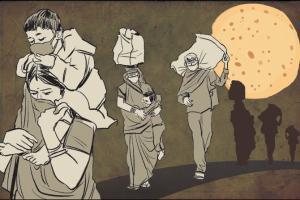They are collecting sanitary napkin kits, providing boiled eggs and rotis to the walking workers, starting community farms, supporting artists or sex-workers

Illustration/Uday Mohite
![]() The act of giving is rarely seen as simple. Many excellent critiques of the upliftment politics of aid and charity exist, along with incisive critiques of documenting other people's suffering. Such criticisms have been expressed in present times also, about middle class self-aggrandisement of relief work, or reporting on workers' plight as trauma porn. Self-righteousness should not prevent us from reflection on these critiques. That said, I do think there is something different happening around us.
The act of giving is rarely seen as simple. Many excellent critiques of the upliftment politics of aid and charity exist, along with incisive critiques of documenting other people's suffering. Such criticisms have been expressed in present times also, about middle class self-aggrandisement of relief work, or reporting on workers' plight as trauma porn. Self-righteousness should not prevent us from reflection on these critiques. That said, I do think there is something different happening around us.
During the Kerala floods, we saw individuals and citizens groups bring creativity, swift-forming networks, efficient structures and foresight to voluntary relief work. In the current crisis, even larger numbers are getting involved—neighbourhood groups, political parties, religious organisations, individuals. Their politically polyglot messages streaming through my social media feed and WhatsApp inbox are really diversity as unity. They are collecting sanitary napkin kits, providing boiled eggs and rotis to the walking workers, starting community farms, supporting artists or sex-workers. Domestic workers who still receive salary and retired pensioners are feeding four or five families around them.
Cynicism, mistrust and apathy have been mainstreamed in past decades. But right now, all of us are vulnerable, and yet, recognise the far greater suffering and vulnerability of our fellow citizens and do whatever we can because our hearts have been split open. For 60 days, the government has been unable to come up with an effective, genuinely helpful plan. Each day the misery of the poor rips through the membrane of pretense. A man dies running to the station for the long-awaited Shramik train because there is no local transport, people cry helplessly as they are apprehended on highways.
The Finance Minister trivialised their need to alleviate their own suffering as 'emotion', as if emotion is a meaningless thing.
Emotion is linked to personhood. When we recognise the right to emotion, we recognise people as people, we respond with empathy. We never hear words of kindness and empathy, even ritualistic ones, from our government, only battle-ready exhortations. This is what makes the emotion that has infused the movements of the last months—whether the anti-CAA protests or the relief efforts of now—politically significant. When people share that a neighbourhood elder contributed paid for fish on poila boishakh in a Kolkata relief kitchen, or that a family of construction workers they were helping support left overnight, but promised to be back next year with grain and vegetable gifts from gaon, we acknowledge everyone's personhood and desire for dignity and connect in a spirit of caring, not power.
When TV news is merely propaganda and witch-hunts, when speeches are all 'Mandrake gestures hypnotically', the reports of independent journalists from the road are significant reminders of journalism's purpose and the inequality of citizenship.
This may not satisfy traditional ideological frameworks we use to recognise resistance. But, it is good to keep our frameworks mulayam, all the better to see things with. The responses of people, rooted in co-operation and concern show a mirror to the policies born from small-hearted politics. During the Kerala floods, citizen's efforts combined with effective governance, maximised impact. Citizen's efforts now desperately fill the gap of governance.
Making claims of upliftment may be an act of self-aggrandisement. The simpler human act of helping someone is an act of confidence and belief. What happens when people gain confidence in themselves and in goodness? Let us see.
Paromita Vohra is an award-winning Mumbai-based filmmaker, writer and curator working with fiction and non-fiction. Reach her at paromita.vohra@mid-day.com
Catch up on all the latest Mumbai news, crime news, current affairs, and a complete guide from food to things to do and events across Mumbai. Also download the new mid-day Android and iOS apps to get latest updates.
Mid-Day is now on Telegram. Click here to join our channel (@middayinfomedialtd) and stay updated with the latest news
 Subscribe today by clicking the link and stay updated with the latest news!" Click here!
Subscribe today by clicking the link and stay updated with the latest news!" Click here!









